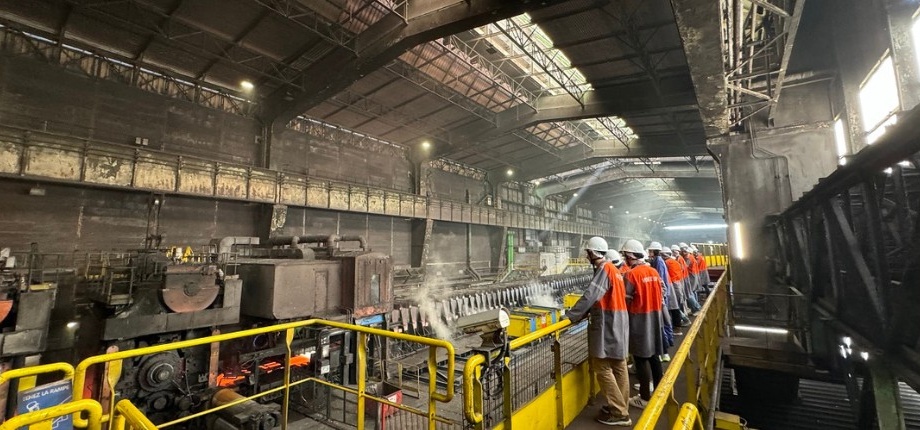Industrial Engineering
The competitiveness of organizations is as much about improving existing processes (customer service, inventory management, production processes, understanding customer needs) as about developing a new product or service offering. It is therefore a matter of educate engineers able to innovate (incrementally and radically) in many contexts, both in products and services and in the organization of companies. Thus, the challenge is as much in the development of technical and operational skills as human ones since any change in the company requires to be able to manage the transformation.
To know the academic prerequisites required to follow the courses in this department, please refer to the prerequisites tab or to the downloadable document.
The engineering programme at École nationale des ponts et chaussées prepares each student to become a real player in sustainable development and planning in all its dimensions. Engineers graduating from École nationale des ponts et chaussées are recognised by companies for their strong scientific skills combined with a capacity for practical implementation of knowledge and projects.
Engineering education at École nationale des ponts et chaussées leads to the development of skills in four dimensions:
Advanced scientific and technical education: understanding and implementing conceptual, mathematical or numerical modelling approaches while knowing how to critically evaluate the results of a model is one of the foundations of the engineering profession that the School's training enables students to master.
Project-based and on-the-job training: from the very first year, numerous collective or individual projects are developed, increasingly close to real engineering projects. For students entering the first year, four internships in laboratories and companies will punctuate the curriculum.
Managerial, human and social skills: integrated from the first year, the human and social sciences give students an understanding of the world and the ability to take into account the problems of society. A solid knowledge of the business world is developed through courses, internships and projects.
The ability to work in a team and to work internationally: 20% of teaching time is devoted to languages. International stays and contact with many foreign students enable engineering students to learn to work in a multicultural context.
In the context of admissions of international students from partner institutions, it should be specified that :
The engineering degree from Ecole nationale des ponts et chaussées is a general engineering degree with prerequisites common to all teaching departments in the School's core disciplines: Mathematics (Optimisation, Probability, Analysis and Scientific Computing), Continuous and Solid Mechanics, Quantum Physics and Statistics, Programming, Human and Social Sciences.
The vast majority of courses in engineering training are in French. A B1 level in French is therefore required to be proven by a certificate (TEF, TCF, DELF, DALF).
A TOEIC score of at least 785 points (or an equivalent international test, such as TOEFL, IELTS or Cambridge Proficiency, CAE or FCE) is required in order to obtain an engineering degree from Ecole nationale des ponts et chaussées at the end of the course. For this reason, a B1 level in English is required for admission, to be proven by a certificate (IELTS, TOEFL, TOEIC, CAMBRIDGE).
In addition, each department of engineering education has specific prerequisites:
Industrial Engineering Department
Programming
Object oriented language (C++ ): efficient use of the programming environment and its tools, code documentation, code factorization, conciseness...
Algorithms and data structures
Notions on the complexity of algorithms. Data structures adapted to a given algorithm. Considerations of memory and computation time efficiency.
Optimization
Kuhn and Tucker conditions: general case, and weak duality; convex case, and strong duality
Algorithms for convex optimization
Linear optimization
Simplex algorithm
Strong duality and fully uni-modular matrices
Linear algebra
Probabilities
Fundamental notions (probability space, random variable, law, expectation...)
Usual laws with real and integer values
Concepts of convergence
Strong Law of Large Numbers
Central Limit Theorem
Main algorithms for simulating random variables
Monte-Carlo method
The 1st year of the program essentially consists of core subjects, leading in the 2nd year to 4 options: Each option is structured around a project (at least 3 days a week) commissioned by an industrial partner, while targeted courses provide students with the necessary theoretical foundations.
- The innovation option consists of a one-year project in a multidisciplinary international design team, working on a real-world brief provided by an industrial client. This program, named ME310, takes place in partnership with the network’s universities, including Stanford, a pioneer in the academic formalization of design thinking, the innovative discipline underpinning this industrial engineering program.
- The supply chain development option is conducted in partnership with the Mastère Spécialisé® (Advanced Master) in Supply Chain Design & Management
- The production option focuses on the specificities of production tools (experimental plan and work on a technological platform).
- The data analytics option focuses on Big Data methodologies as applied to the Supply Chain. It is conducted in partnership with the Applied mathematics and computer science Department.
| Semester | Year Master cycle | Course title | ECTS | Status | Track | Instruction language |
| Fall | 1 | Business management | 2 | Compulsory | French | |
| Fall | 1 | Flow Modeling and Simulation Tools | 1 | Compulsory | French | |
| Fall | 1 | Humanities & Social Sciences | 3 | Compulsory | French | |
| Fall | 1 | Industry Professions | 1 | Compulsory | French | |
| Fall | 1 | Mélusine department project | 5 | Compulsory | French | |
| Fall | 1 | Numerical statistics & data analysis | 2 | Compulsory | French | |
| Fall | 1 | Operational Research | 3 | Compulsory | French | |
| Fall | 1 | Planning and modeling of production systems | 3 | Compulsory | French | |
| Fall | 1 | Software development technique | 3 | Compulsory | French | |
| Fall | 1 | Supply Chain Management | 3 | Compulsory | French | |
| Fall | 1 | Theory & Methods of Design for Innovation | 3 | Compulsory | French | |
| Spring | 1 | Industry of the Future | 1 | Compulsory | French | |
| Spring | 1 | Introduction to law | 3 | Compulsory | French | |
| Spring | 1 | Lean Manufacturing | 0,5 | Compulsory | French | |
| Spring | 1 | Practice of learning methods - Big data | 2 | Compulsory | French | |
| Spring | 1 | Corporate financial strategy | 3 | Elective | French | |
| Spring | 1 | Corporate Strategy | 3 | Elective | French | |
| Spring | 1 | Innovative business creation | 2 | Elective | French | |
| Spring | 1 | Optimization and control | 3 | Elective | French | |
| Spring | 1 | Sustainable development: the role of actors and the challenge of collective action | 2,5 | Elective | French | |
| Spring | 1 | Waste prevention and management / water resource management | 3 | Elective | French | |
| Spring | 1 | Innovation protection | 3 | Semi-elective | Design Engineering & Innovation | French |
| Spring | 1 | Marketing of new products | 3 | Semi-elective | Design Engineering & Innovation | French |
| Spring | 1 | Project Innovators | 3 | Semi-elective | Design Engineering & Innovation | French |
| Spring | 1 | Purchasing & Competitiveness | 3 | Semi-elective | Operations Engineering & Optimization | French |
| Spring | 1 | Scientific Project | 3 | Semi-elective | Operations Engineering & Optimization | French |
| Spring | 1 | Vagary & Real Time in the Supply Chain | 3 | Semi-elective | Operations Engineering & Optimization | French |
| 1 | Coaching and Career Guidance | 0,5 | Compulsory | French | ||
| 1 | Internship | 2,5 | Compulsory | |||
| 1 | Languages | 7,5 | Compulsory | |||
| 1 | Sport | 1 | Compulsory | French | ||
| Fall | 2 | Internship feedback | 1,5 | Compulsory | French | |
| Fall | 2 | Languages | 4,5 | Compulsory | ||
| Fall | 2 | Risk in all its forms | 1,5 | Compulsory | French | |
| Fall | 2 | Environmental economics | 3 | Elective | French | |
| Fall | 2 | Freight Transportation Systems | 3 | Elective | French | |
| Fall | 2 | Sociology of organizations and business | 3 | Elective | French | |
| Fall | 2 | Statistical forecasting and demand management | 2 | Elective | English | |
| Fall | 2 | Transportation system analysis and design | 3,5 | Elective | French | |
| Fall | 2 | Advanced algorithmic programming | 2 | Semi-elective | Data Analytics | French |
| Fall | 2 | Climate Change Sciences | 1,5 | Semi-elective | Supply Chain of the Future | French |
| Fall | 2 | Data Analytics for operations | 10 | Semi-elective | Data Analytics | French |
| Fall | 2 | Design and operation of logistics and transport systems | 3 | Semi-elective | Supply Chain of the Future | French |
| Fall | 2 | Fourier analysis | 2 | Semi-elective | Data Analytics | French |
| Fall | 2 | Life Cycle Assessment | 1,5 | Semi-elective | Supply Chain of the Future | French |
| Fall | 2 | Stochastic processes and applications | 3 | Semi-elective | Data Analytics | French |
| Fall | 2 | Sustainable development in the supply chain | 10 | Semi-elective | Supply Chain of the Future | French |
| Fall | 2 | Transport Externalities: Elements of Analysis | 4 | Semi-elective | Supply Chain of the Future | French |
| Spring | 2 | Graduation Project | 30 | Compulsory |
- Corporate Strategy
- d.thinking introduction seminar
- Industrial engineering project "Mélusine"
- Innovation in action (project)
- Marketing of high-tech products
- Operational research and optimization
- Portfolio of skills
- Procurement Buying
- Production management
- Protection of innovation
- Science and technology for the industry of the future
- Seminar on Industry
- Supply Chain Management
- The Hidden Value : lean in manufacturing and services
- Warehousing & logistics
Access to the entire range of courses is not guaranteed: some courses are limited in number or have specific pre-requisites.
To consult the accessibility of the courses in the catalog > go to the "department" tab.
Up to 30% of programme courses can be chosen among other departments (City, Environment, Transportation; Civil and structural engineering; Mechanical Engineering and Materials Science; Applied mathematics and computer science; Economics, management, finance; Languages and Cultures; Humanities and Social Sciences).
These professions are a fast track to management positions in large global industrial corporations:
- industrial management
- procurement management
- supply chain management
- heading a strategic business unit
- director of strategy and development
- brand management
- management of a geographical area or activities in a country/zone
The Department’s position at the interface of two sectors – product innovation and design on the one hand, production and supply chain on the other – offers exceptional career opportunities, not only in terms of job mobility, but also mobility between sectors and between countries.

